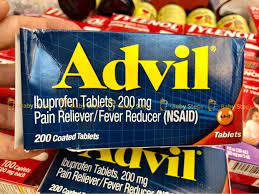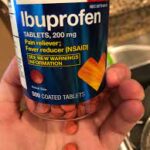How Long Does Ibuprofen (Advil) Stay In Your System?

Advil is one of the name-brand versions of ibuprofen. You may know that it relieves minor aches, pains, and fever. However, you may not know the side effects of this common drug. Ibuprofen belongs to a group of drugs called nonsteroidal anti-inflammatory drugs (NSAIDs).
These drugs temporarily reduce the amount of prostaglandins made by your body. Your body releases prostaglandins when you have an injury. These hormone-like substances contribute to inflammation, which includes swelling, fever, and increased sensitivity to pain.
How should I take Advil?
Use Advil exactly as directed on the label, or as prescribed by your doctor. Use the lowest dose that is effective in treating your condition.
An Advil overdose can damage your stomach or intestines. The maximum amount of Advil for adults is 800 milligrams per dose or 3200 mg per day (4 maximum doses).
A child’s dose is based on the age and weight of the child. Carefully follow the dosing instructions provided with children’s Advil for the age and weight of your child. Ask a doctor or pharmacist if you have questions.
Take Advil with food or milk to lessen stomach upset. Shake the oral suspension (liquid) before you measure a dose. Use the dosing syringe provided, or use a medicine dose-measuring device (not a kitchen spoon).
You must chew the chewable tablet before you swallow it.
Store at room temperature away from moisture and heat. Do not allow the liquid medicine to freeze.
How long does Advil stay in your system?
There are several factors that come into play when estimating how long Advil will stay in your system because every patient has physiology unique to them. Here are some major factors you should consider when trying to understand how long Advil will stay in your body:
• Age: Typically, the younger you are, the more efficient your body functions are. The more efficient your body functions, the faster Advil will be removed from your system.
• Body height/weight/fat: Your specific prescribed Advil dosage corresponds to your body height, weight, and fat. Usually, larger people will be given a higher dosage of Advil. The higher the dose of Advil you have been taking, the longer Advil will take to be removed from your system.
• Genetics: Genes predispose people to different metabolic functions, which is a key factor in how your body processes medications like Advil. For this reason, your genetic makeup comes into play when estimating how long Advil will remain in your system.
• Kidney and liver functions: The liver and kidneys eliminate everything you ingest, and Advil is no exception. If your liver or kidneys are damaged, it will most likely take longer for your body to remove the Advil from your system.
• Metabolism: Your metabolism determines how quickly you process foods, liquids, and medications such as Advil. If your metabolism is slow, it will take longer for your body to process and eliminate Advil from its system than someone with a fast metabolism.
• Usage frequency: The longer you have been taking Advil, the longer it will remain in your system. For example, it will take longer for someone who has taken Advil for several years to remove Advil from the body than someone who has only been taking Advil for a few months.
According to the prescribing information, Advil (Ibuprofen) is rapidly absorbed, reaching peak serum levels one to two hours after administration, and has a half-life of 1.8 to two hours, it can take up to 24 hours to completely rid your system of Advil (Ibuprofen), even though its effects generally last about 4 to 6 hours. Advil 12Hour is a bi-layer tablet. The first layer dissolves quickly to relieve pain fast. The second layer is sustained-release to give relief of persistent pain for up to 12 hours. In case of an ibuprofen overdose, call 911 or Poison Control at 800-222-1222.
What are the side effects of Advil (Ibuprofen)?
There is no safe level of drug use. Use of any drug always carries some risk – even medications can produce unwanted side effects. It’s important to be careful when taking any type of drug.
Advil (Ibuprofen), affects everyone differently, based on:
- size, weight and health
- whether the person is used to taking it
- whether other drugs are taken around the same time
- the amount taken.
The most common side effects of ibuprofen are:
- headache
- dizziness
- drowsiness, fatigue and restless sleep
- thirst and sweating
- tingling or numbness in hands and feet
- ringing in the ears
- blurred vision and eye irritation
- fluid retention and ankle swelling
- mild allergic reaction
- abdominal pain, nausea, vomiting, heartburn, diarrhoea and constipation
- bladder irritation and pain, frequent urination.
NSAIDs such as Advil can increase the risk of heart attack or stroke in people with or without heart disease or the risk factors for heart disease.
Advil Overdose
If you take more than the recommended dose of Advil, you could overdose. Seek emergency medical attention or call the Poison Help line at 1-800-222-1222. Overdose symptoms may include nausea, vomiting, stomach pain, drowsiness, black or bloody stools, coughing up blood, shallow breathing, fainting, or coma.
Long-term effects of Advil
It’s best to discuss the side effects of long-term use with a medical practitioner. Regular use of ibuprofen may eventually cause:
- anemia due to bleeding in the stomach
- impaired hearing
- kidney and liver damage
- bleeding in the stomach and bowels
- increased risk of a heart attack.
- Using ibuprofen with other drugs.
The effects of taking Advil with other drugs, including alcohol, prescription medications, and other over-the-counter medicines, are often unpredictable. Ibuprofen taken with alcohol can increase the risk of stomach irritation and discomfort.
Advil can alter the effects of some blood pressure medicines and may increase the risk of bleeding if taken with medicines such as warfarin.





